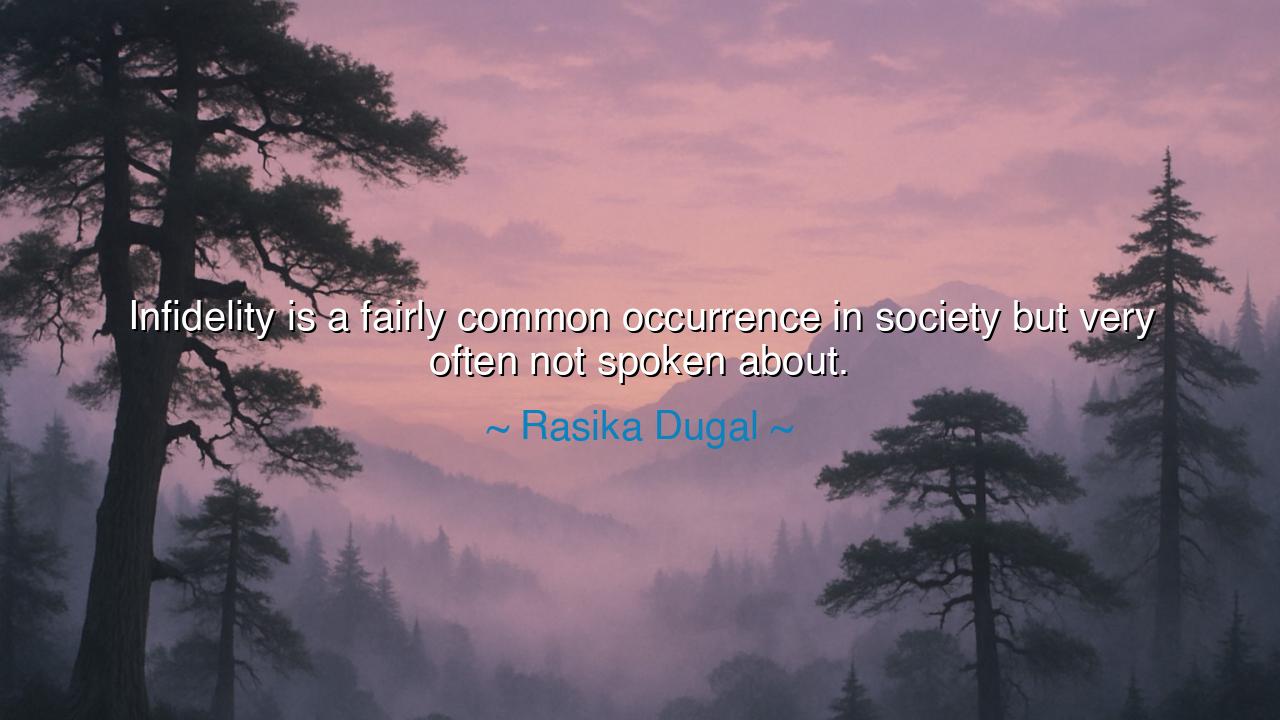
Infidelity is a fairly common occurrence in society but very






"Infidelity is a fairly common occurrence in society but very often not spoken about." These words from Rasika Dugal strike at the heart of a deep and painful truth—that the betrayal of trust, the breaking of sacred bonds between lovers, is not only common but also often hidden beneath the surface of polite society. While the world parades its ideals of fidelity, loyalty, and commitment, the truth of infidelity lurks in the shadows, whispered about in hushed tones or entirely silenced by the weight of shame. It is a truth that societies have long struggled to address, a wound that is rarely seen in the light of day but festers beneath the surface.
In the ancient world, love and fidelity were revered as sacred. Homer’s Iliad and Odyssey speak of the heroic deeds and the tragic consequences of betrayal. The relationship between Penelope and Odysseus is one of great faithfulness on both sides. Penelope, awaiting the return of her husband from war, remains loyal, despite the advances of many suitors. Her devotion is a symbol of the strength of marriage and the enduring power of love. And yet, even in these sacred tales, we hear of the tensions that arise when fidelity is threatened. The Greeks, like us, understood that infidelity could fracture the very foundations of a union, and so, they often elevated loyalty as one of the highest virtues in a relationship.
Yet, even in ancient Greece, infidelity was not unheard of. The gods themselves were not immune to the temptation of betrayal. Zeus, the king of the gods, was infamous for his many affairs, despite his marriage to Hera, a union that was supposed to symbolize the ideal of marital loyalty. Hera, in turn, often sought vengeance on Zeus’ lovers, reinforcing the idea that even in the realm of the gods, infidelity brought pain and strife. Infidelity, it seems, is as old as human existence itself, woven into the very fabric of human nature, and yet we are rarely prepared to speak openly about it, to confront its truth with honesty and wisdom.
The modern world, too, is rife with the same unspoken reality. Infidelity in contemporary society is often brushed aside, hidden behind the walls of privacy, protected by the fear of judgment, and left unspoken even when the pain is evident. Films, books, and popular media often glamorize the act of betrayal or depict it as a tragic yet necessary part of love. Yet, in private, its consequences are far from glamorous. Relationships shattered, families broken, and trust destroyed—these are the true consequences of infidelity, though they are seldom discussed with the openness they deserve. The silence surrounding infidelity is a silence that harms, preventing us from learning, growing, and ultimately healing.
Take, for example, the tragic tale of King David from the Bible. His infidelity with Bathsheba, the wife of Uriah, led to one of the greatest moral failures in his life. His actions not only caused the death of Uriah but also led to a fall from grace that affected his family, his kingdom, and his legacy. David, a man who was once celebrated as a hero and a man after God’s own heart, is brought to a reckoning with his own conscience, a reckoning that is both painful and humbling. His story reminds us that even the mightiest among us are vulnerable to the temptations of betrayal, and yet, it is only through acknowledging and repenting our wrongs that we can hope to heal.
Rasika Dugal’s words remind us that infidelity is not an isolated act—it is a symptom of society's broader issues with how we view love, commitment, and honesty. Infidelity occurs when the pressure to conform to ideals of perfection in relationships, combined with personal desires, leads individuals to betray the very trust they once held dear. But infidelity is also a reflection of the deeper failings of a society that often glorifies imperfection, self-interest, and immediacy over the virtues of loyalty, compassion, and self-control.
The lesson here is twofold: first, we must begin to speak openly about the issue of infidelity, not in a spirit of condemnation but in the spirit of understanding and healing. We must confront the truth that betrayal is not a simple sin but a complex human flaw, often rooted in unspoken pain and unmet needs. Second, we must strive to create relationships that are built not on superficial promises, but on deep mutual respect, understanding, and honesty. Infidelity is not inevitable, but it can be averted when we cultivate relationships that are grounded in the values that bind us together as humans. Let us be mindful of the truth and integrity that must guide our relationships, for only in these can we hope to rise above the brokenness that infidelity so often leaves in its wake.
In our lives, let us begin by examining our own relationships—how we value trust, fidelity, and honesty in our most intimate connections. Let us not shy away from discussing the hard truths, for only by acknowledging the painful realities of human nature can we hope to forge deeper, more enduring bonds. In doing so, we can transform the silence surrounding infidelity into an opportunity for growth, healing, and the creation of more authentic, nurturing connections.






AAdministratorAdministrator
Welcome, honored guests. Please leave a comment, we will respond soon